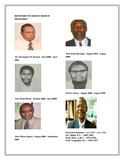| dc.description.abstract | Since its inception in 1956 when the University of Nairobi was still the Royal Technical College of East Africa, the Department of Geology has trained the bulk of professional geologists within Kenya (over 90%) and a significant number within the Eastern African Region and beyond.
The Department of Geology has one of its Strategic Objective of tailoring its academic programs to retain a strong responsiveness to basic training in Geological Sciences and Geotechnology. The Department trains in B.Sc., B.Ed. Science (Geology option), B.Sc. & B.Ed. (Science) by Open and Distance Learning, B.Sc. in Environmental Geosciences, M.Sc., PhD and Post Graduate Diploma in Environmental & Disaster Management Courses . The core areas of specialisation include Mineralogy and Petrology, Economic Geology and Mineral Resources, Environmental Geology and Management, Engineering Geology, Hydrogeology and Groundwater Resources Management, Petroleum Geology, Marine Geology and Resources, Applied Geochemistry, Applied Geophysics, Seismology, Palynology and Micropalaentology, and Mineral Exploration.
Foremost the Department has continued to offer unique services in the areas of national interest in earthquake monitoring, landslide studies, monitoring volcanic activities as well as in mineral resource studies and research. Currently the Department is in the process of establishing a state-of the art GIS & Remote Sensing Laboratory that will enhance further research in the aforementioned disciplines.
The Department has continued to grow in student and staff numbers, in physical facilities, as well as in broadening and advancing academic programmes. It has continued to offer valuable service courses to many other key departments at the University of Nairobi in the following Colleges; Architecture and Engineering, Agriculture and Veterinary Sciences, Humanities and Social Sciences and Education and External Studies. Hence, the Department of Geology heartedly embraces the new University vision and mission. About 1200 students at the University of Nairobi do some aspects of geological studies.
There have been novel advances in the field of geological sciences particularly during the past three decades that have significantly advanced our knowledge. In tandem with this development there has been great improvements in the approach, methodology and techniques used to study the geological environment. Such methodological advances include the use of Geographic Information Systems (GIS); satellite remote sensing of surface and subsurface earth structures and features; minerals, petroleum and energy exploration involving the integrated and cross-disciplinary use of sophisticated tools and instruments such as gravimeters, terrameters, magnetometers (field based) and X-ray fluorescence, X-ray diffractometer, scanning and ion electron microprobe analysers (laboratory based) and others. Despite lack of some of these equipment in the Department, the academic staff have remained on the cutting edge of research, employing such tools through intensive collaboration with other universities, the industry, and research institutions nationally and internationally. Hence, there is the need to expand and enhance the geological sciences programmes and facilities to meet these emerging developments.
The Department is strong in seismic studies and hosts a National Seismological Network which monitors earthquakes in the region. Data from two seismic stations (KMBO PS24 and USGS) is internationally telemetered to Comprehensive Nuclear Test Ban Organization in Vienna, Austria and to the American Geological Society at Washington DC in U.S.A.
The Department of Geology is one of the four Departments of the School of Physical Sciences in Chiromo Campus within the College of Biological and Physical Sciences situated about 3 kilometres from the City Centre in a cool conducive environment for learning. The Department is therefore open and welcomes you all who are keen to advance your knowledge in Geological Sciences through studies (including Distance Learning), through research and development for a better planet Earth. | |

